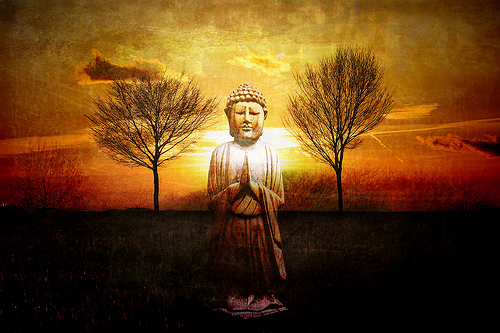It was one of those moments that any spiritual aspirant longs for.
I was sitting at the feet of a great master, and had the opportunity to ask him only one question. But what to ask? For me, that was easy.
I had to know what he thought about this dichotomy between “going with the flow” and making plans to lead a spiritual life. On the one hand, living in the moment seems like going with the flow, but as I had experienced, the flow didn’t always take me where I wanted to go.
While sitting on a bare tile floor that evening at a forest monastery in Thailand, getting eaten alive by mosquitoes, I waited patiently while my question was translated, answered and then translated back to me. I can’t say I was expecting the answer that I got, but either way, it rang true to me and I’ve been striving to implement it ever since.
What he said was that if we want to live according to the dhamma, or truth, we need to be intentional about it.
If we don’t make plans to practice, life will end up happening to us and we will be tossed around, bypassing experiences and end up resorting to our habits.
“Intention is what we want to do, habits are what we end up doing if we’re not careful.”
~ Patrick Creelman
As romantic as it sounds to live in the moment and always go with the flow, it’s not common for spontaneity to lead to dedicated practice. The truth is, we have habituated tendencies to behave in certain ways and if we look closely at those tendencies, we’ll probably find they aren’t serving us on our path. In order to create new, more skillful tendencies, we must put in the hours.
So here’s where it gets tricky: just by putting in the hours doesn’t guarantee that we’ll see the changes we wish to see. And yes, we should know exactly what those changes are. If you don’t know where you want to go, you won’t end up there. This is what Ajahn Anan, the Buddhist master in Thailand, was getting at. You have to have a goal; you have to have a direction. But this isn’t my problem.
I have a goal, and I’ve learned to get really clear about where I’m going and what kind of skillful tendencies I’d like to develop. I have a good idea of what my strengths are and what I need to work on. I’m dedicated, determined, disciplined and devoted, but at the end of the day, there comes a time when none of that matters anymore.
This is called the decisive moment.
It all comes down to the moment when the practice needs to be integrated into my daily life, and in those moments, I continue to find myself choosing to fall back into my old habits instead of rising to my highest potential.
What good is the practice if it doesn’t translate into a better life?
We can stack up hour after hour, but it is in that moment when a decision needs to be made that our place on the path is revealed. With any spiritual practice, we run the risk of practicing for the wrong reasons. Forcing myself to practice, by making plans to do so and then dragging my feet—determined to reach my goal, is nothing more than working towards another achievement to boast about later.
Is that really why I’m doing this?
The Buddha didn’t just talk about effort in his Noble Eightfold Path; he talked about wise effort.
This not only means that we need to find the right intensity, but that our efforting is carried with the right energy and for the right reasons.
We might start out with wholesome intentions; to wake up in order to help other people, but if we’re not careful, the ego will step up and claim any small victories that it can. Sure, it feels good to reach your goal and you will feel a sense of having accomplished something good for yourself, but when these feelings arise, it’s important to remember why you are here in the first place. It’s not for a trophy or a victory—let’s not turn spirituality into some sort of game or competition.
By all means, make serious plans to pursue your spiritual practice; otherwise, it’s just not going to happen.
Basically, it means you might have to sacrifice that trip to the beach on your next vacation and use it instead to go on a meditation retreat. What’s more important to you, catching some rays and lying on the sand or waking up? But just remember, it doesn’t matter how many retreats you sit or how many hours you practice.
What really matters is that decisive moment when you have to choose between doing what you know will best serve you on your path, and taking the easy road, and that’s a moment you can’t plan for.
Love elephant and want to go steady?
Sign up for our (curated) daily and weekly newsletters!
Editor: Catherine Monkman
Photo: Flickr












Read 0 comments and reply